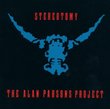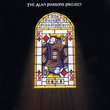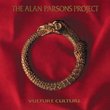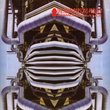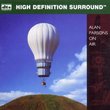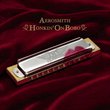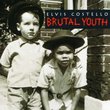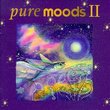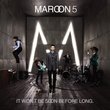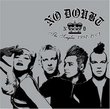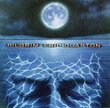| All Artists: Alan Parsons Title: Try Anything Once Members Wishing: 0 Total Copies: 0 Label: Arista Original Release Date: 10/26/1993 Release Date: 10/26/1993 Genres: Pop, Rock, Classic Rock Styles: Progressive, Progressive Rock, Album-Oriented Rock (AOR) Number of Discs: 1 SwapaCD Credits: 1 UPC: 078221874120 |
Search - Alan Parsons :: Try Anything Once
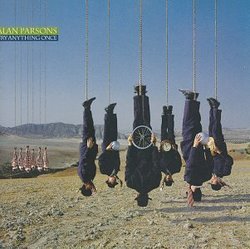 | Alan Parsons Try Anything Once Genres: Pop, Rock, Classic Rock
Hier ist die Labelbbezeichnung |
Larger Image |
CD DetailsSynopsis
Album Description Hier ist die Labelbbezeichnung Similar CDs
Similarly Requested CDs
|
CD ReviewsTry Anything Once Harry Brewer | S'port, La. | 01/19/2009 (4 out of 5 stars) "Parsons eleventh studio album, though no longer tagged as A.P. Project, was his first release in six years. It was the best thing he had done since Ammonia Avenue released in 1984. The biggest difference is that Eric Woolfson's presence is gone but, surprisingly, not missed (he did co-write one song). Another difference is there doesn't appear to be a central theme to the album, at least, it's not clear or obvious. It still doesn't detract from the effort made in Parsons' collection of artists, it's very good. The album opens with "Three of Me" which starts off like a Parsons instrumental but then changes into a short piano piece, then back into instrumental territory vaguely reminding one of the Beatles & film music curiously mixed; finally the song breaks into the vocal section. David Pack (Ambrosia) provides the lead vocal. "Turn It Up" follows which was written by Ian Bairnson, Parsons long time lead guitarist. It's one of the better songs on the album. Chris Thompson does lead vocal & is a perfect match for the song. "Wine From the Water" was co-written by Parsons & Bairnson. It has a pop feel with a moderate tempo. Lead vocal is courtesy of Eric Stewart (10cc). The lyrics are interesting but I'm not sure what they mean. "Breakaway" is an instrumental written by Parsons. It's a typical effort by Parsons, he can do this in his sleep & it's still ear candy. Richard Cottle provides an incredible sax solo. "Mr. Time" is one of the album's standout tracks that features Jacqui Copland doing the lead vocal, she also co-wrote it with the drummer, Stuart Elliott & Driscoll. Copland's vocals perfectly match the flow of the song which somewhat disguises the chilling finality of the lyrics. The next song is "Jigue", an instrumental penned by Andrew Powell & Parsons. It's main section is very Celtic with Graham Preskett providing the fiddle. "Jigue"s change up section features Bairnson on lead guitar, first on an electric, then an acoustic. The Celtic section is fantastic & will have you wanting to dance. It closes with a sax solo from Cottle. "I'm Talkin' to You" is a collaboration between Pack & Powell & is one of the songs on the album that has a more pop inclination. "Siren Song" is a slow song that suffers somewhat in comparison to the album's other songs. It's my least favorite on the album. Stewart does the lead vocal & it's more like a 10cc song. "Dreamscape" is another instrumental written by Parsons. It also sounds Celtic & features but two musicians: Bairnson on guitars & Cottle on synthesizers. This one isn't so much like ear candy, more like a lovely ballad without lyrics. "Back Against the Wall" is my personal favorite on the album. It's written by Bairnson, once again Chris Thompson does the lead vocal & is perfectly matched for the song. The lyrics are dark & foreboding with a very faint glimmer of hope. The instrumental section picks up the pace until it returns to the main theme of the song. Most of us know the feeling that's spoken about here: "When you feel your back against the wall." "Re-Jigue" revisits the same themes from "Jigue" only this time with a full orchestra,the famous Philharmonic Orchestra. This version feels like it came straight out of movie; Bairnson provides his best lead solo on the album. The album closes with "Oh Life (There Must Be More)". It's written by Pack & Parsons with Pack doing the lead vocal. With this song one might suspect that the theme of this album might have to do with death & the after life. Alan Parsons has again put together a well crafted album that deserved more airplay & recognition. It did peak at #122 on Billboard's album charts but there weren't any charting singles. This cd has now been discontinued & will only get more expensive with time. I can recommend this album as worth getting, not necessarily at any cost, but at any within reason. Remember, if you don't get this, then you didn't Try Anything Once." ...And Again, and Again, and Again..... P. Zeller | Vincent, OH | 03/26/2010 (5 out of 5 stars) "So why, in 2010, am I writing a review for a disc that is nearly 20 years old and is out-of-print? As a "born-again" Alan Parsons fan having recently purchased this album for the first time, I just feel like more should be said on this apparently criminally over-looked disc.
As you are probably aware, this was the first album by Alan Parsons after the "Project" ceased to be with the departure of Eric Wolfson (R.I.P. Eric!). As it is one of the few Alan Parsons discs currently out of print, one must also assume that it did not perform well commercially, at least relative to most of the rest of his catalog. Based on hearing this for the first time recently, that can not be because of the music. (One must assume that this album was the commercial victim of the on-set of grunge...) After several passes through this album now, this has to be one of his better sets of music overall and certainly one the most satisfying to listen to, as a whole, since at least Ammonia Avenue. (one of my top 3 APP albums) Rather than go through a song-by-song description of this album, I will hit on a few highlights. The disc, as a whole, is an essay on our search for self-worth, both inside and outside. The album has a slightly dark feel in that, for most of the songs, he highlights our failures in this search, all while you feel that the answer is right outside our grasp, floating along with us. This theme is at once both apparent and yet subtle throughout. This disc contains four instrumentals, all very good in their own right. Two of them stand out, Jigue and Re-Jigue. These two pieces are a recasting of a basic Scottish or Irish melody (It sounds familiar but, as yet, I have not been able to identify the original.) These two pieces provide for a very interesting study in "Composition 101 - How to develop varients on a theme with in a single composition". It takes this simple melody, casts it at different tempos, changes textures with different instruments and harmonies, and at one point, even throws in a saxophone (in an celtic piece - and this actually seems to work!) to make for a very involving listen. Re-jigue takes that same theme and creates a symphonic version which could have come straight from a good movie score. The next interesting point of note is the involvement of David Pack on several of these songs. I believe this is the first (and last time?) David performed on a Alan Parsons release. This would seem to be a paring that should have worked together far more often. There are three songs, The Three of Me, I'm Talkin to You, and Oh Life, which he sings on. All three are good songs and David sings as well as I have ever heard him sing on any album. In fact, if you are a David Pack or Ambrosia fan, you absolutely must hear Oh Life (There must be more) all the way through. This is the absolute best song on the disc and may be the best single Alan Parsons piece ever. (No, that is not hyperbole.) It is certainly David Pack at his very best! Two other songs of note are Mr. Time and Back Against the Wall. Mr. Time includes a female lead singer (I do not have her name with me at this point) who sings a classic female lead vocal similar to those on Eve and Pyramid. Back Against the Wall is a very good song in the same vein as up-tempo pieces from several of the albums in the 80s. This brings me to my final point. Listening to Try Anything Once, you get a sense that Alan Parsons is both closing out his APP era and starting to look forward. The music is at once both reminiscent of the groups previous out-put while presenting some strong hints at potential future direction. It is clear that Alan does not see his musical identity wrapped up with Alan Parsons Project, while it is also clear that he has a great love for that history as well. As such, this album presents a very compelling colleague of all things APP, from the over-reaching theme, to the music, right down to the (of course) pristeen production. Yet, there is a "new feel", relative to Alan Parsons, that is moving along within this disc as well. This is even further highlighted if you listen to Gaudi and Try Anything Once in order. For this reason, I recommend getting your hands on a copy and try it again, and again, and again. To paraphrase, "you can't just listen to it once!"" |

 Track Listings (12) - Disc #1
Track Listings (12) - Disc #1